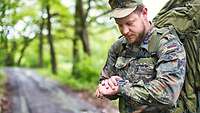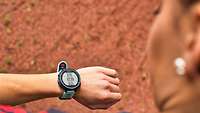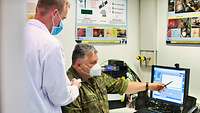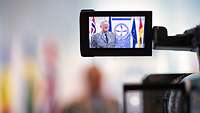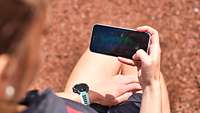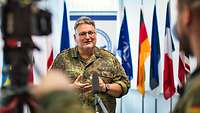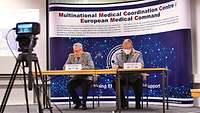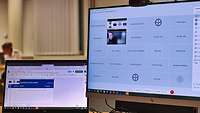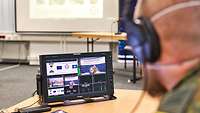Biosensors in the Medical Service: Workshop for the future
Biosensors in the Medical Service: Workshop for the future
- Date:
- Reading time:
- 3 MIN
From 18 to 20 May 2021, the Koblenz Multinational Medical Coordination Centre/European Medical Command (MMCCMultinational Medical Coordination Centre/EMCEuropean Medical Command) hosted a civil-military digital event on the subject of biosensors. With 30 high-ranking lecturers from science and future users, the event offered a comprehensive programme and forum.
Passen Sie jetzt Ihre Datenschutzeinstellungen an, um dieses Video zu sehen
- copyright:
- © Bundeswehr
The 130 registered participants from approx. 20 countries listened to topical and interesting briefings on the main topics fitness for duty, biosensor technology in support of medical care, as well as ethical and legal provisions regarding the use of biosensors. Beside the issues from the different subject and specialised areas like biology, physics, medicine, military medicine, cyber security, as well as sports and health sciences, a controversial discussion on the use of biosensors or wearables in the medical service was initiated.
Biosensors in the military
International lecturers demonstrated first positive experience and illustrated that some of the medical services of EUEuropean Union and NATONorth Atlantic Treaty Organization armed forces already make use of this technological progress. In many situations, military personnel must also go to their performance limits and even beyond. Biosensors can help to support health-promoting and preventive measures. They offer a particular role in military medicine, and especially in the treatment of casualties. They can accelerate decision-making processes, record the medical condition of the casualties more quickly, and this way relieve medical personnel.
Tried and tested in private life
The sports scientist and passionate runner, Captain Dr Monika Rausch is supported by biosensors almost every day. "I monitor physiological and performance-related data, like my heart rate, running speed, and distances. Biosensors have long been indispensable in sports, so why not also in the military?" asked Rausch.
"I am convinced that biosensors can improve military performance and provide practical support to training."
Save lives in critical situations
Lieutenant Alexander Schäbler, who also was part of the team organising the workshop, can report from his own experience. "As operations officer, I have already experienced several grave situations and, therefore, know how important it is to stay on top of things in critical moments." In a mass casualty (MASCALMass Casualty) incident, the real-time recording and transmission of casualty data, that is the data of the injured and wounded service members, could be ensured and, thus, lives saved, said Schäbler.
Biosensors as interface between man and machine
Trust in the evaluation of the data gathered by artificial intelligence within the scope of casualty care was one of the core issues of the workshop. Classification of injured and wounded soldiers by means of a combination of sensors and artificial intelligence, and the decision on who will receive life-saving treatment and who will not, is not only a technical but also a moral and ethical issue.
Applications improving and reducing performance
When using biosensors and wearables as a new method for improving the performance of service members, various ethical questions have to be answered. Regarding data security, it must be prevented that data collected by biosensors are manipulated or intercepted. Implementation of data protection was one of the key issues of this workshop to be answered in the future.
Focal tasks and challenge of the future
MMCCMultinational Medical Coordination Centre/EMCEuropean Medical Command is involved in the operational use of this promising field of medical care, which is one of its future focal tasks. Telemedicine (telehealth) is a highly relevant challenge. In cooperation with the NATONorth Atlantic Treaty Organization Telehealth Panel, MMCCMultinational Medical Coordination Centre/EMCEuropean Medical Command - with the networking of leading experts in the field of biosensor technology - will continue to contribute to establishing a community of interest (COICommunity of Interest) on the subject of wearables and telehealth. The workshop provides the basis for establishing a multinational, civil-military and interdisciplinary hub. From here, common fields of action and projects are to be identified in the future.
Passen Sie jetzt Ihre Datenschutzeinstellungen an, um dieses Video zu sehen
- copyright:
- © Bundeswehr


